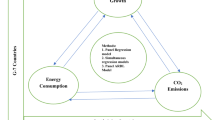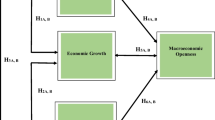Abstract
We adopt the FMOLS and Granger causality technique to analyse the effect of energy use and carbon emissions on output growth in selected West African economies, which includes Nigeria, Gambia and Ghana, from 1970 to 2019. Findings confirm that energy use enhances growth in the three selected West African economies. But in terms of significance, energy consumption is significant in Nigeria and Gambia at a 1% level of significance while it is insignificant for the Gambia. CO2 emission positively and significantly propels economic growth for the three selected West African economies. For Nigeria, causality evidence shows no direct influence among the variables. For Ghana, we find a bi-causal association between output growth and carbon emissions and a unidirectional causality from pollution to energy consumption. For Gambia, economic growth causes CO2 emissions. We recommend that the West African government reinforce their stand on a sustainable growth path through energy conservation.



Similar content being viewed by others
Data availability
The data used in this study are available from the corresponding author on reasonable request.
References
Adhikari D, Chen Y (2012) Energy consumption and economic growth: a panel cointegration analysis for developing countries. Rev Econ Finance 3(2):68–80
Ajide KB, Mesagan EP (2022) Heterogeneous analysis of pollution abatement via renewable and non-renewable energy: lessons from investment in G20 nations. Environ Sci Pollut Res:1–14
Apergis N, Payne JE (2009) Energy consumption and economic growth in Central America: evidence from a panel cointegration and error correction model. Energy Econ 31(2):211–216
Barro RJ (1996) Determinants of economic growth: a cross-country empirical study (No. w5698). National Bureau of Economic Research.
Be Forward (2019) https://blog.beforward.jp/regional-topics/africa/cars-capita-africa-country-cars-road.html. Accessed on November 27, 2021.
Boopen S, & Vinesh S (2011) On the relationship between CO2 emissions and economic growth: the Mauritian experience. In University of Mauritius, Mauritius Environment Outlook Report, http://www. csae. ox. ac. uk/conferences/2011-EDiA/papers/776-Seetanah. pdf 14:2015.
BP Statistical Review of World Energy (2021) Data on world energy by countries and regions. Available at: http://www.bp.com/statisticalreview. Accessed on November 27, 2021.
Centurion Analysis (2021) https://centurionlg.com/2021/10/04/steps-taken-by-the-government-to-achieve-renewable-energy-growth-in-nigeria/. Accessed on November 27, 2021.
Charfeddine L, Kahia M (2019) Impact of renewable energy consumption and financial development on CO2 emissions and economic growth in the MENA region: a panel vector autoregressive (PVAR) analysis. Renew Energy 139:198–213
Chen H (2010) The analysis model of co-integration on economic growth and energy in China. In 2010 The 2nd Conference on Environmental Science and Information Application Technology (Vol. 3, pp. 712-715). IEEE.
Costantini V, Martini C (2010) The causality between energy consumption and economic growth: a multi-sectoral analysis using non-stationary cointegrated panel data. Energy Econ 32(3):591–603
Dantama Y & Inuwa N (2012) The relationship between energy consumption and economic growth in Nigeria JORIND 10 (3), December, 2012. ISSN 1596 - 8308. www.transcampus.org./journals pp 293-300.
Dogru T, Bulut U, & Sirakaya-Turk E (2019) Modeling tourism demand: theoretical and empirical considerations for future research. Tourism Economics, XX(X):1-16.
Energy for Growth Hub (2018) https://www.energyforgrowth.org/memo/five-electricity-policy-priorities-for-nigeria/ November 27, 2021.
Eregha PB, & Mesagan EP (2017) Energy consumption, oil price and macroeconomic performance in energy dependent African countries. Прикладная эконометрика, (2 (46)).
Global Edge Report (2021) https://globaledge.msu.edu/countries/nigeria/economy Accessed on November 27, 2021.
Heshmati A (2001) The dynamics of capital structure: evidence from Swedish micro and small firms. Res Bank Financ 2(1):199–241
Ighodaro CA (2010) Co-integration and causality relationship between energy consumption and economic growth: further empirical evidence for Nigeria. J Bus Econ Manag 1:97–111
International Trade Administration, US Department of Commmerce Report (2021) https://www.trade.gov/knowledge-product/ghana-mining-industry-equipment Accessed on November 27, 2021.
Isola WA, Mesagan PE (2014) Impact of oil production on human condition in Nigeria. West African Journal of Monetary and Economic Integration 14(1):84–102
Jalil A, Mahmud SF (2009) Environment Kuznets curve for CO2 emissions: a cointegration analysis for China. Energy Policy 37(12):5167–5172
Kadir N, Nayan S, Noor ANM, & Zakaria DA (2019) Tourism, carbon dioxide emissions and economic growth: evidence from panel data. In Proceedings of the Second International Conference on the Future of ASEAN (ICoFA) 2017-Volume 1 (pp. 391-398). Springer, Singapore.
Keller KR (2006) Education expansion, expenditures per student and the effects on growth in Asia. Glob Econ Rev 35(01):21–42
Lau E, Chye XH, Choong CK (2011) Energy-growth causality: Asian countries revisited. Int J Energy Econ Policy 1(4):140
Lee JW (2018) Long-run dynamics of renewable energy consumption on carbon emissions and economic growth in the European Union. Int J Sustain Dev World Ecol 26(1):69–78
Mahalik MK, Mallick H, Padhan H (2021) Do educational levels influence the environmental quality? The role of renewable and non-renewable energy demand in selected BRICS countries with a new policy perspective. Renew Energy 164:419–432
Maji IK, Sulaiman C, Abdul-Rahim AS (2019) Renewable energy consumption and economic growth nexus: a fresh evidence from West Africa. Energy Rep 5:384–392
Mallick H (2008) Examining the linkage between energy consumption and economic growth in India. J Dev Areas:249–280
Mesagan EP (2015) Economic growth and carbon emission in Nigeria. IUP J Appl Econ 14(4):61–75
Mesagan EP (2021a) Efficiency of financial integration, foreign direct investment and output growth: policy options for pollution abatement in Africa. Economic Issues 26(1):1–19
Mesagan EP (2021b) Environmental sustainability in sub-Saharan Africa: the case of production and consumption activities. J Knowl Econ:1–28
Mesagan PE, Adeniji-Ilori OM (2018) Household environmental factors and childhood morbidity in South-western Nigeria. Fudan J Humanit Soc Sci 11(3):411–425
Mesagan EP, Nwachukwu MI (2018) Determinants of environmental quality in Nigeria: assessing the role of financial development. Econ Res Finance 3(1):55–78
Mesagan EP, Olunkwa CN (2022) Heterogeneous analysis of energy consumption, financial development, and pollution in Africa: the relevance of regulatory quality. Util Policy 74:101328
Mesagan PE, Alimi OY, Adebiyi KA (2018) Population growth, energy use, crude oil price, and the Nigerian economy. Econ Stud J (Ikonomicheski Izsledvania) 27(2):115–132
Mesagan PE, Isola WA, Ajide KB (2019) The capital investment channel of environmental improvement: evidence from BRICS. Environ Dev Sustain 21(4):1561–1582
Mesagan EP, Ajide KB, Vo XV (2021a) Dynamic heterogeneous analysis of pollution reduction in SANEM countries: lessons from the energy-investment interaction. Environ Sci Pollut Res 28(5):5417–5429
Mesagan EP, Akinyemi AK, Yusuf IA (2021b) Financial integration and pollution in Africa: the role of output growth and foreign direct investment. International Journal of Big Data Mining for Global Warming 3(1):1–21
Mesagan EP, Akinsola F, Akinsola M, Emmanuel PM (2022) Pollution control in Africa: the interplay between financial integration and industrialization. Environ Sci Pollut Res:1–11
Mohsin M, Hanif I, Taghizadeh-Hesary F, Abbas Q, Iqbal W (2021) Nexus between energy efficiency and electricity reforms: a DEA-based way forward for clean power development. Energy Policy 149:112052
Munir Q, Lean HH, Smyth R (2020) CO2 emissions, energy consumption and economic growth in the ASEAN-5 countries: a cross-sectional dependence approach. Energy Econ 85:104571
OEC Report (2021) https://oec.world/en/profile/country/gmb. Accessed on November 27, 2021.
Omay T, Hasanov M, & Ucar N (2014) Energy consumption and economic growth: evidence from nonlinear panel cointegration and causality tests. Прикладная эконометрика, (2 (34)).
Omojolaibi JA (2010) Environmental quality and economic growth in some selected West African Countries: a panel data assessment of the environmental Kuznets curve. J sustain dev Afr 12(8):35–48
Onuonga SM (2012) The relationship between commercial energy consumption and gross domestic income in Kenya. J Dev Areas:305–314
Ouedraogo NS (2013) Energy consumption and economic growth: evidence from the economic community of West African States (ECOWAS). Energy Econ 36:637–647
Ozturk I, Acaravci A (2010) CO2 emissions, energy consumption and economic growth in Turkey. Renew Sust Energ Rev 14(9):3220–3225
Pata UK (2018) Renewable energy consumption, urbanization, financial development, income and CO2 emissions in Turkey: testing EKC hypothesis with structural breaks. J Clean Prod 187:770–779
Pedroni P (2001) Fully modified OLS for heterogeneous cointegrated panels. In Nonstationary panels, panel cointegration, and dynamic panels. Emerald Group Publishing Limited.
Shaari MS, Rahim HA, Rashid IMA (2013) Relationship among population, energy consumption and economic growth in Malaysia. Int J Soc Sci 13(1)
Solow RM (1956) A contribution to the theory of economic growth. Q J Econ 70(1):65–94
Swan TW (1956) Economic growth and capital accumulation. Econ Rec 32(2):334–361
Tang CF, Tan BW (2015) The impact of energy consumption, income and foreign direct investment on carbon dioxide emissions in Vietnam. Energy 79:447–454
USAID West Africa GHG Emission Factsheet (2019) https://www.climatelinks.org/sites/default/files/asset/document/2019_USAID_West%20Africa%20Regional%20GHG%20Emissions%20Factsheet.pdf Accessed on 24th November, 2021.
Vidyarthi H (2013) Energy consumption, carbon emissions and economic growth in India. World J Sci Technol Sustain Dev
Waheed R, Sarwar S, Wei C (2019) The survey of economic growth, energy consumption and carbon emission. Energy Rep 5:1103–1115
West African Economic Outlook Report (2020) https://www.afdb.org/en/documents/west-africa-economic-outlook-2020-coping-covid-19-pandemic. Accessed on 20th November, 2021.
World Development Indicators (2020) The World Bank, Databank. Available at: http://databank.worldbank.org/data/reports.aspx?source=world-development-indicators. Accessed 12th November, 2021.
Worlddata Info (2021) https://www.worlddata.info/africa/nigeria/energy-consumption.php Accessed on 26th November, 2021.
Worldometre (2021) https://www.worldometers.info/world-population/western-africa-population/#:~:text=The%20current%20population%20of%20Western,among%20subregions%20ranked%20by%20Population. Accessed on 20th November, 2021
Yao C, Feng K, Hubacek K (2015) Driving forces of CO2 emissions in the G20 countries: an index decomposition analysis from 1971 to 2010. Ecol Inform 26:93–100
Zhang XP, Cheng XM (2009) Energy consumption, carbon emissions, and economic growth in China. Ecol Econ 68(10):2706–2712
Zhou N, Fridley D, McNeil M, Zheng N, Ke J, & Levine M (2011) China’s energy and carbon emissions outlook to 2050 (No. LBNL-4472E). Lawrence Berkeley National Lab. (LBNL), Berkeley, CA (United States).
Author information
Authors and Affiliations
Contributions
EPM conceptualised and presented the literature review.
EO analysed the results and conducted the editorial review of the paper.
HA presented the methodology section.
All authors read and approved the final manuscript.
Corresponding author
Ethics declarations
Ethics approval and consent to participate
Not applicable.
Consent for publication
Not applicable.
Competing interests
The authors declare no competing interests.
Additional information
Responsible Editor: Roula Inglesi-Lotz
Publisher’s note
Springer Nature remains neutral with regard to jurisdictional claims in published maps and institutional affiliations.
Rights and permissions
About this article
Cite this article
Mesagan, E.P., Osuji, E. & Agbonrofo, H. Comparative analysis of the growth impact of pollution and energy use in selected West African nations. Environ Sci Pollut Res 29, 66438–66449 (2022). https://doi.org/10.1007/s11356-022-20532-3
Received:
Accepted:
Published:
Issue Date:
DOI: https://doi.org/10.1007/s11356-022-20532-3




